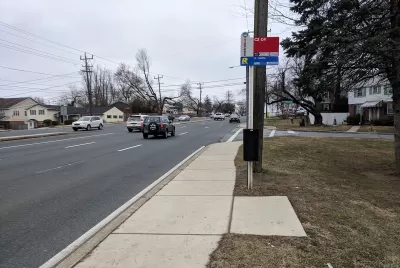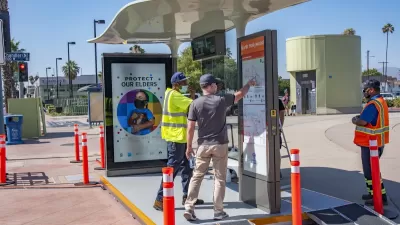Areas most exposed to extreme heat also tend to lack bus shelters and benches at bus stops.

Writing in Greater Greater Washington, Madeleine Bartin outlines the results of her research on how resources are allocated around Washington, D.C.’s transit stops, finding that some of the neighborhoods that experience the hottest temperatures thanks to the urban heat island effect are also least well-equipped with shelters and benches at bus stops.
According to Bartin’s research, “Metro stations with the lowest average percentages of 14-20% of stops having shelters were located entirely in Northeast and Southeast DC. The lines most covered were predominantly located in Northwest DC.”
People who aren’t affected by the design choices may not register them as exclusionary.
In D.C., the Washington Metropolitan Area Transit Authority (WMATA) awards a franchise agreement to Clear Channel Outdoor to build and maintain bus shelters in exchange for advertising space. Because the company is allowed to consider “the advertising market potential” in their site selection, the company is incentivized to see the shelters as revenue boosters rather than as public amenities.
Bartin calls this an issue of spatial justice — “a field of study that acknowledges the impact of urban design and access to public resources.” As Bartin explains, “features of cities that we often take for granted—like shade, heat, and bus stops—are not uniform, or innate, but shaped by human interaction.” The decisions made by policymakers and planners impact who has access to public resources.
FULL STORY: Some of the most sweltering DC neighborhoods lack bus shelters. Cooler spots have them

Trump Administration Could Effectively End Housing Voucher Program
Federal officials are eyeing major cuts to the Section 8 program that helps millions of low-income households pay rent.

Planetizen Federal Action Tracker
A weekly monitor of how Trump’s orders and actions are impacting planners and planning in America.

Ken Jennings Launches Transit Web Series
The Jeopardy champ wants you to ride public transit.

Opinion: Transit Agencies Must View Service Cuts as Last Resort
Reducing service could cripple transit systems by pushing more riders to consider car ownership, making future recovery even less certain.

‘Smart Surfaces’ Policy Guide Offers Advice for Building and Maintaining Urban Tree Canopies
Healthy, robust tree canopies can reduce the impacts of extreme heat and improve air quality.

New Jersey Lawsuit Targets Rent-Setting Algorithms
The state of New Jersey is taking legal action against landlords and companies that engage in what the state’s Attorney General alleges is illegal rent fixing.
Urban Design for Planners 1: Software Tools
This six-course series explores essential urban design concepts using open source software and equips planners with the tools they need to participate fully in the urban design process.
Planning for Universal Design
Learn the tools for implementing Universal Design in planning regulations.
Heyer Gruel & Associates PA
Ada County Highway District
Institute for Housing and Urban Development Studies (IHS)
City of Grandview
Harvard GSD Executive Education
Toledo-Lucas County Plan Commissions
Salt Lake City
NYU Wagner Graduate School of Public Service





























